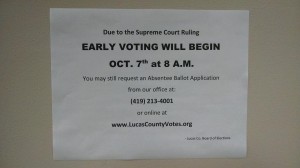After SCOTUS ruling Ohio election boards prepare for early voting — a week later

By Maggie Thurber | for Ohio Watchdog
EARLY VOTING: A simple sign in the lobby of the Lucas County early vote center informs voters of the Supreme Court decision that delayed voting until Oct. 7.
With a U.S. Supreme Court ruling halting early voting that was to begin Tuesday, local election boards are back to their daily routine — at least for one more week..
The Supreme Court granted a stay of a lower court ruling that set expanded times for early voting and reinstated the so-called “golden week” during which individuals could register and vote at the same time.
“Were ready to start — everything was prepared,” said Brenda Hill, president of the Lucas County Board of Elections. “The ruling didn’t come down until after everything was set up. Now it just gets put off until next week.”
Hill, one of three new board members in Lucas County, said the board was notified of the decision after the close of business Monday.
The original order by U.S. District Judge Peter Economus of the Southern District of Ohio said the law eliminating “golden week” was unconstitutional. He also ruled the early voting schedule set by Secretary of State Jon Husted on Feb. 25 needed to be amended to include more dates and times.
The case was brought by the American Civil Liberties Union on behalf of the National Association for the Advancement of Colored People, the League of Women Voter and several African-American churches.
Following the ruling, Husted issued a new directive to local boards setting an early voting schedule that complied with the order.
Now the state is back to the original hours.
“We get directives almost every day,” Hill explained. “Our job isn’t to determine the policy, but to follow the directives.”
Hill, a Democrat, former Republican Judge Peter Handwork and Republican attorney Mark Wagoner, Sr., joined existing Democrat John Irish on the board July 11.
Husted fired three of the previous board members and placed Irish on suspension, citing a “culture of dysfunction” in the office and calling Lucas County his “biggest problem area” in the entire state.
Handwork said he knew very little about the problems at the BOE, other than what he’d learned in various news reports.
“It felt to me like it was a lot of personal egos that were getting in the way of doing the job that needs to be done,” he said. “Some people forgot why they were there and pursued personal agendas for whatever reason.”
He said the new board has a fine rapport.
“We committed to each other that we had no intention of recreating what had gone on in the past and vowed to never let it happen again,” he said.
That approach is serving them well, considering the highly politicized nature of the current debate.
Plaintiffs claim the early voting schedule and elimination of golden week unconstitutionally hamper minorities, low-income and homeless voters and was an intentional effort by Republicans to suppress the vote of traditionally Democratic voters.
Husted, citing an earlier ruling by Economus in a separate case, said he was only trying to follow prior court orders to establish uniform voting times. Attorneys for the state argued Ohio’s voting opportunities were more generous than 41 other states.
Both sides claimed the court decisions would confuse voters.
The state argued before Economus that changing the dates and times for early voting would be disruptive to a schedule in place since February.
ACLU of Ohio Legal Director Freda Levenson said the last-minute Supreme Court decision would “cause tremendous confusion among Ohioans about when and how they can vote.”
“I’m sure there will be some confusion because the changes were so late in the day,” Hill agreed.
“Maybe some people who aren’t listening to the news didn’t get the message,” she added. “So if they go to the early voting center, they need to be able to get the information about where they can vote and when.”
Handwork didn’t want to speculate about possible confusion.
“It’s our job as board members to completely explain the parameters of what the voting options are and, hopefully, they won’t be confused,” he said. “With proper notification, they’ll understand when they can vote and where and if there is any confusion it will be our job to eliminate it.”
He called the claims of confusion “advocacy” on the part of the parties in the case, saying it was “an attempt to persuade and to sway the court one way or another.”
Hill said it’s the law that matters.
“I can’t say one way or the other what I think about it. Our job is to do whatever the law says,” she added.
As a former judge, Handwork said he might have a better understanding of the law, but the board has a limited role.
“I come at it with the perspective that we have to follow the law and respect the law and give everyone the opportunity to vote within the law and the parameters the law has established,” he said.
Every registered voter in the state was mailed a card to request an absentee ballot. Voters can cast a paper absentee ballot up to the Nov. 4 election.
Early voting on the electronic machines, also considered to be an absentee ballot, will begin Oct. 7. Hours are 8 a.m. to 5 p.m. Monday–Friday, 8 a.m. to 4 p.m. Saturday, Oct. 25, and Saturday, Nov. 1, and 1-5 p.m. on Sunday, Nov. 2.







